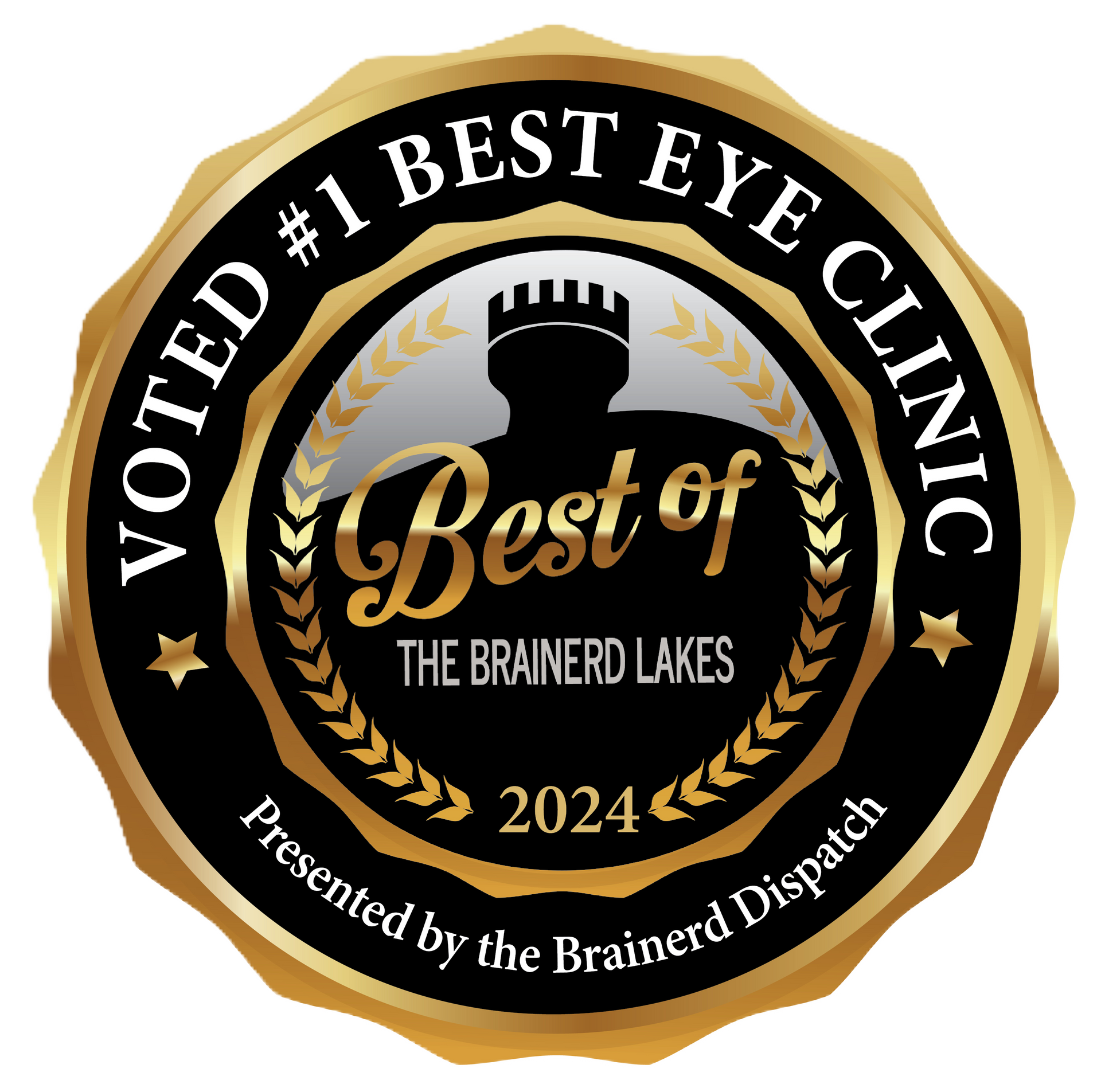Eye Conditions: Amblyopia, Cataracts, Diabetes, Glaucoma, AMD
Amblyopia
Amblyopia, or lazy eye, is a condition that affects 4 in 100 children. It usually has no symptoms apparent to the child, the parent, or the pediatrician. It is characterized by poor sharpness of vision in one or both eyes that cannot be corrected with glasses and is not associated with other eye diseases. Sometimes, an eye may turn in or out if amblyopic, but only sometimes. Family history may play a role in lazy eyes or with eyes not working together. The earlier the condition is detected and treated, the more successful the outcome may be. If left untreated past age 6 or 7, the child may have permanent vision reduction in that eye.
Diagnosis of amblyopia is made with a comprehensive eye examination. Visual acuity and eye teaming can be assessed as early as age 6 months. Undetected, high refractive error is a common cause of lazy eyes. Treatment usually includes using an eye patch and wearing eyeglasses. Recent studies have shown that patching the good eye while doing detailed near tasks for just 2 hours a day is just as effective as longer patching times. Atropine drops may be effective as well if patching is not tolerated.
Links to more information on amblyopia: www.patchpals.com - Informative website about successful patching
Cataracts
A cataract is a cloudiness or opacity of the eye's internal lens. A cataract can form because of aging, injury, inflammation, metabolic disorders such as diabetes, or hereditary factors. Medicines such as steroids, excessive exposure to sunlight, smoking, and high alcohol consumption may also increase your risk of developing cataracts. Surgery is the only treatment currently available.
Many people have early cataracts and may not be aware of them. Symptoms of blurred vision and increased glare are common as cataracts develop. Your glasses prescription may change often, and you may require sunglasses to help with the glare. When new glasses don't help, and your vision interferes with the necessities and pleasures of your lifestyle, then it is time for surgery. There are medical circumstances when surgery would be advised as well. If the cataract is preventing the doctor from examining the back of your eye or if it is too advanced to be causing other problems, then surgery may be mandatory. Thus, the decision to have an operation can be made only after a thorough examination and discussion with your Brainerd Eyecare Center optometrist.
Cataract Surgery
Once you decide to consider cataract surgery, we will help you select a surgeon. A consultation at the surgeon's office will be scheduled, and a thorough discussion of the procedure, including benefits and risks, will take place. Most cataract surgery is done under local anesthesia as an outpatient procedure and is painless. It usually takes less than an hour, and you go home the same day. The surgeon makes a small incision in the periphery of the cornea. With an ultrasound probe, the lens in your eye is broken apart and removed. A plastic intraocular lens implant is then inserted. Because the incision is only 3 to 4 millimeters, suturing may not be necessary and visual recovery is rapid.
Can a cataract grow back once it has been removed? No, but some people develop a cloudiness of the membrane behind the implant. This can occur months or years after cataract surgery and causes a gradual blurring of vision. A Yag laser procedure can clear away this cloudy membrane and straightforward vision returns.
Cataracts are very common. In fact, over half of people between the ages of 65 and 75 have cataracts. If you have cataracts, we will recommend a follow-up examination schedule, help you decide when surgery is necessary, select the best surgeon for you, and provide much of your post-operative care. We will happily provide you with additional information and answer any questions. Please Contact Us. Be sure to ask us for the latest information at your subsequent eye examination.
Diabetes
Diabetes is a chronic disorder that causes blood sugar levels to be too high. Approximately 31 million Americans have diabetes, and the numbers are increasing. Over time, diabetes can cause changes in your eyes, nerves, kidneys, heart, and blood vessels. Every year, as many as 24,000 people lose their sight from diabetic retinopathy, and in 90 percent of these cases, blindness could have been prevented with early diagnosis and treatment.
Diabetic retinopathy is a disease that damages the blood vessels in the retina, the light-sensitive tissue at the back of the eye. It has no symptoms and affects nearly half of people with diabetes. If detected and treated in a timely manner, severe vision loss can usually be prevented. People who have had diabetes for several years and those with poorly controlled blood sugars have higher risks of developing eye complications. Background diabetic retinopathy is the early stage of retinal disease and requires only careful monitoring. If new blood vessels form on the retina, it is called proliferative retinopathy and needs prompt treatment. Fluid leaking from blood vessels in the retina's center can also occur, known as macular edema.
Who Can Get Diabetic Eye Disease?
Anyone with diabetes can develop eye disease—even those people who control their blood sugars with diet and exercise or oral medications.
What Are the Symptoms?
Often, there are no symptoms in the early stages. Vision may be excellent until the disease becomes severe. There is no pain or redness in the eyes.
How Is Diabetic Eye Disease Detected?
Only by having a comprehensive eye examination. This includes having your pupils dilated for a detailed examination of your retina. Tests will also be done to detect glaucoma, cataracts, and eye muscle imbalance, as these conditions are much more common in people with diabetes.
How Is Diabetic Retinopathy Treated?
Laser surgery is used to treat the proliferative form of diabetic retinopathy. A small laser light is aimed through the pupil and onto the retina. The beam of light makes hundreds of tiny burns on the retinal surface, destroying the growth of new blood vessels. In macular edema, the laser light seals the leaking blood vessels. Current treatment is approximately 90 percent successful, but early treatment is most successful.
What Can You Do to Keep Your Eyes Healthy?
Keep your blood sugars under reasonable control. Bring your blood pressure down, as high blood pressure can make eye problems worse. See us immediately if you should notice blurred or double vision, sudden onset of flashes or floaters, or any pain or redness of your eyes. Most importantly, have a comprehensive eye examination at least once a year, even if you have no apparent problems.
Ask us for the latest information at your subsequent eye examination.
Glaucoma
Glaucoma is a group of eye diseases that damage the optic nerve, causing vision loss and possible blindness if untreated. In many, but not all cases, glaucoma is associated with rising pressure within the eye. Glaucoma is a leading cause of blindness, affecting nearly 3 million people in the United States. Because there are no early symptoms, 50 percent of people with glaucoma do not know they have it. The good news is that with preventive eye examinations, early detection, and treatment, it is possible to control glaucoma and prevent blindness in most cases.
Clear fluid flows in and out of a space in the front of the eye called the anterior chamber. Proper fluid drainage keeps the eye's pressure at an average level. In glaucoma, the fluid drains out of the eye too slowly, resulting in pressure buildup. If the pressure is not controlled, damage to the optic nerve will occur, causing vision loss.
In the early stages of glaucoma, there is usually no pain or vision change. Sight loss is a gradual process, with peripheral vision first affected. Unless diagnosed and treated, central vision will eventually be affected. Glaucoma can be detected through eye examinations and special tests. These include evaluating intraocular pressure (pressure within the eye), corneal thickness, the optic nerve, the nerve fiber layer, the anterior chamber angle, and visual fields.
Eye drops are usually effective in reducing and controlling eye pressure. Surgery is considered if medications have failed to control eye pressure. Surgery can take the form of laser surgery or conventional surgery. Periodic eye examinations with your eye care professional are essential to determine the effectiveness of treatment.
Although anyone can get glaucoma, some factors increase the risk of developing glaucoma. The following groups have an increased risk of getting glaucoma:
- Anyone over 60.
- People of African descent.
- People who have a family history of glaucoma.
- People with diabetes.
The best way to protect your vision from glaucoma is to have your eyes examined through dilated pupils by an eye care professional every one to two years.
Age-Related Macular Degeneration (AMD)
It is a degeneration of the retina's central portion (back of the eye). It can cause a loss of central, sharp vision, but side vision usually remains intact. Studies show that people in their fifties have a 2% risk of developing AMD, but that risk rises to 30% if you are over age 70. If your parents have AMD, your risk is 50%. Other risk factors include smoking, high blood pressure, high cholesterol, diet, obesity, and ultraviolet light. AMD is the leading cause of blindness in people over 55.
AMD can be dry, meaning no new blood vessel growth or fluid leakage exists. About 90% of AMD patients have the dry form of the disease. Dry AMD is best managed through risk factor control, improved nutrition, and continued monitoring by your doctor. Wet AMD can cause rapid and severe loss of central vision. Prompt diagnosis and treatment with injectable drugs or laser surgery may be necessary to stop the progression and irreversible loss of vision.


